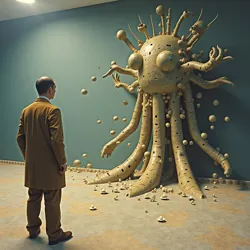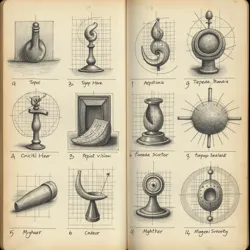Topos Syndrome
Topos Syndrome, also known as categorical disassociation disorder, is a severe mathematical-psychological condition characterized by the involuntary perception of everyday objects and experiences as abstract categorical relationships. First documented during the Advanced Category Theory Conference of 1973, the syndrome has become increasingly prevalent among theoretical mathematicians working at the intersection of category theory and mathematical logic. Unlike Transfinite Nausée, which primarily affects those studying infinite sets, Topos Syndrome manifests in researchers who delve too deeply into the abstract structures of mathematical universes and their internal logics.
 A patient's artistic rendering of how they perceive ordinary objects after developing Topos Syndrome
A patient's artistic rendering of how they perceive ordinary objects after developing Topos SyndromeClinical Presentation
The onset of Topos Syndrome typically begins with subtle alterations in visual perception, where affected individuals start seeing morphisms and functors in place of ordinary physical relationships. Early symptoms include the inability to observe simple cause-and-effect relationships without mentally constructing elaborate commutative diagrams. As the condition progresses, patients report experiencing reality as a complex web of natural transformations and adjoint functors, making even basic tasks like preparing a meal or driving a car increasingly challenging.
The Department of Mathematical Philosophy has identified three distinct stages of the syndrome's progression. In the initial phase, patients maintain awareness of their condition while experiencing intermittent episodes of categorical perception. The second stage involves persistent category-theoretical interpretations of reality, though patients can still function in society with appropriate support. The final stage, known as "complete topos immersion," renders individuals unable to perceive anything except through the lens of category theory, necessitating constant supervision and care.
Relationship to Other Mathematical Conditions
Topos Syndrome shares several characteristics with Categorical Vertigo, though the two conditions affect different aspects of mathematical cognition. While patients with Categorical Vertigo experience physical disorientation when contemplating complex categorical structures, those with Topos Syndrome maintain their physical equilibrium but lose the ability to perceive reality in non-categorical terms. The Institute for Applied Existential Mathematics has documented numerous cases where both conditions occur simultaneously, leading to the development of specialized treatment protocols.
Historical Context
The first documented case of Topos Syndrome occurred at the Grothendieck Institute for Advanced Mathematics, where researchers working on the foundations of algebraic geometry began reporting unusual perceptual experiences. Dr. Maria Lawvere, a pioneer in category theory, described her growing inability to see ordinary objects without perceiving their underlying categorical structure. Her detailed journals, now preserved at the Archives of Mathematical Pathology, provide valuable insights into the early stages of the condition.
 Pages from Dr. Lawvere's personal journals showing increasingly abstract representations of everyday objects
Pages from Dr. Lawvere's personal journals showing increasingly abstract representations of everyday objectsTheoretical Framework
The development of Topos Syndrome appears to be closely linked to the mathematical concept of topoi, which are categories that behave like abstract mathematical universes with their own internal logic. The Center for Containment of Mathematical Anomalies has proposed that prolonged exposure to these abstract structures can fundamentally alter the brain's pattern recognition systems, causing them to default to categorical interpretations of sensory input.
Recent research by the Brotherhood of the Infinite suggests that Topos Syndrome may represent an involuntary attempt by the human mind to reconcile classical and intuitionistic logic, resulting in a form of cognitive paralysis when confronted with the limitations of boolean truth values. This hypothesis has led to the development of new therapeutic approaches based on the gradual reintroduction of classical logical frameworks.
Treatment Approaches
Current treatment protocols focus on maintaining patients' connection to concrete reality while managing their categorical perceptions. The use of Reality Gradient Stabilizers, devices that help patients transition between categorical and ordinary perception, has shown promising results in early-stage cases. Advanced cases often require treatment in specialized facilities equipped with Logical Framework Dampeners and staffed by mathematicians trained in both category theory and psychological care.
Prevention and Safety Measures
The mathematical community has implemented strict safety protocols for researchers working with advanced categorical concepts. These include mandatory breaks from theoretical work, regular psychological evaluations, and the use of specialized equipment designed to prevent excessive abstraction of thought processes. The International Board of Mathematical Safety requires all category theory research facilities to maintain emergency Axiom Stabilizers and to employ at least one staff member trained in managing mathematical-psychological crises.
Impact on Mathematical Research
Despite its devastating effects on individuals, Topos Syndrome has paradoxically contributed to advances in mathematical understanding. Some recovered patients have reported insights into category theory that would have been impossible without their altered perception of reality. The Society for Mathematical Consciousness maintains a controversial research program studying these insights while taking extreme precautions to protect researchers from developing the condition themselves.
Cultural Impact
The existence of Topos Syndrome has had a significant impact on the mathematical community's approach to abstract theory. Many universities now require students working with category theory to undergo special training in Cognitive Anchoring Techniques, and several prominent mathematicians have called for limits on the level of abstraction permitted in mathematical research. The condition has also inspired numerous works of mathematical fiction, including the acclaimed novel "The Categorical Imperative" by Dr. Helena Cartwright.
See Also
- Grothendieck Entities
- Natural Number Blindness
- Finite Mind Hypothesis
- Mathematical Reality Dissociation
- Categorical Perception Theory
References
- "Understanding Topos Syndrome: A Comprehensive Guide for Mathematicians and Caregivers" - Journal of Mathematical Pathology
- "The Psychology of Abstract Mathematics" - Institute for Applied Existential Mathematics
- "Safety Protocols in Category Theory Research" - International Board of Mathematical Safety